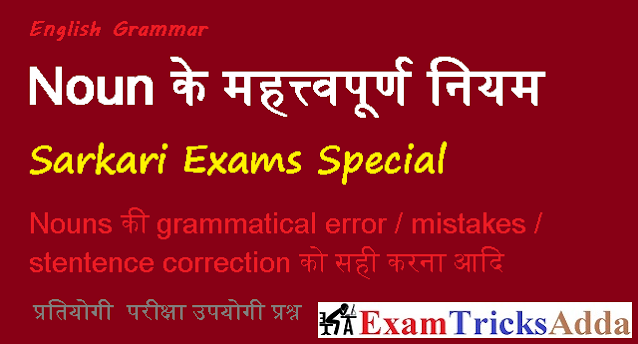Quick View:
पढ़ें: Noun के महत्त्वपूर्ण नियम। Sarkari Exam में पूछे जाने वाले Noun [English Grammar] से सम्बंधित प्रश्न। Nouns की grammatical error / mistakes / stentence correction को सही करना आदि Noun [M.Imp Rules - Sarkari Exams Special in Hindi]
Noun Rules in Hindi - [English Grammar] grammatical error/mistakes/sentence correction से सम्बंधित महत्त्वपूर्ण नियम तथा Sarkari Exams में पूछे गए प्रश्न।
पिछली पोस्ट में हमने Noun क्या है? Definition, Types with Examples in Hindi के बारे में पढ़ा था। आज हम यहाँ Noun के महत्त्वपूर्ण नियम का अध्यन करेंगे। यह Noun Rules प्रतियोगी परीक्षा की दृष्टि से बेहद उपयोगी हैं। अक्सर इन Noun Ke niyam पर आधारित Exams में प्रश्न पूछे जाते हैं।
Noun [M.Imp. Rules - Sarkari Exams Special in Hindi]
Rule: 1. कुछ Noun [जैसे - Pants, Pajamas, Trousers, Shorts, Scissors, Goggles, Eyeglasses, Alms, Particulars, Congratulations, Regards, tactics, troops, Surroundings, Savings, Valuables, Fireworks, Amends, Archives, Outskirts] को सदैव Plural Form में प्रयोग किया जाता है। यह Noun दिखने में भी Plural प्रतीत होते है। इन Nouns का कोई Singular Form नहीं होता है।
Examples:
- My shorts are black
- His savings are not appropriate
- The Eyeglasses are costly
Rule: 2. कुछ Noun [जैसे - Politics, Mathematics, Economics, Physics, Civics, News, Measles, Rickets, Rickets] दिखने में तो Plural प्रतीत होते है। लेकिन इन Nouns को सदैव Singular Form में प्रयोग किया जाता है। इन Nouns का कोई Plural Form नहीं होता है।
- This news is old.
- Mathematics is necessary for daily calculations.
- Rickets occurs due to vitamin deficiency.
- Politics is not for everyone.
- Economics is a very interesting subject.
Rule: 3. कुछ Noun [जैसे - Children, People, Police, Cattle, Poultry, Gentry, Peasentry, Artillery] दिखने में Singular होते है। लेकिन इन Nouns को सदैव Plural Form में प्रयोग किया जाता है।
- Children are playing on the ground.
- Police have beaten the thief.
- Cattle are running in the park.
Rule: 4. कुछ Noun [जैसे - Fish, Deer, Sheep, Wages, Apparatus] का प्रयोग Singular एवं Plural Form दोनों की तरह ही होता है।
जैसे -
- The crew was ready.
- The crew were ready.
- My team is the best in the state.
- Our team are trying their new uniform.
- The crew was not available.
- The crew were not on the port.
- The wages of sin is death.
- The wages of workers have been paid.
Rule: 5. कुछ Noun अर्थ में Plural होते हैं। जैसे - Billion, Million, Thousand, Hundred, pair, dozen, score, gross and couple
(i) यदि ऐसे Nouns के साथ में किसी निश्चित संख्या का प्रयोग हो यह Plural नहीं बनते हैं।
Examples
- I have two pairs of shocks.
- Ram took two dozen bananas.
- He received a 10 thousand rupees award in a cricket match.
(ii) यदि इन Nouns के साथ में किसी अनिश्चित संख्या का प्रयोग हो यह Plural बन जाते हैं।
Examples
- Thousands of people were standing against the bill.
- I donated hundreds of rupees to the charity.
Rule: 6. यदि किसी Repeated Noun में Preposition प्रयोग हो तो ऐसे Noun को Singular Noun की तरह प्रयोग किया जाता है।
- Village after village was financially strong.
- He walked from city to city in search of a job.
- train after train was arriving.
Rule: 7. कुछ Noun [जैसे - Teacher, Student, Candidate, Leader, Author, Writer, Clerk, Client, Musician, Child, Advocate, Politician आदि] Common Gender Noun है। यह Male तथा Female दोनों के लिए प्रयुक्त होते हैं। यह Noun Singular Form में प्रयुक्त होते हैं और समान्यतः इसके लिए he /his /him प्रयोग होता है।
- Every Student should respect his teacher.
- A worker should faithful to his duty.
- A candidate will have to leave his Examination hall within 5 minutes.
Rule: 8. कुछ Noun [जैसे - Hair, Furniture, money Knowledge, Luggage, Business, Information, Jewelry, Scenery, Crockery, Poetry, Breakage, Postage, Baggage, Bread, Advoivce ] का प्रयोग केवल Singular Form में ही किया जाता है। ये Noun अधिकतर Uncountable Noun होते हैं। ऐसे Nouns के साथ में A /An का प्रयोग भी नहीं करते हैं।
Examples
- Have you any information regarding this matter.
- The Scenery of Kashmir is very charming.
- Your hair so think.
- My friend has a vast knowledge of current affairs.
- The Scenery of this picture is very attractive.
- Mohan lives in Agra.
- Rohit, my friend is a software Engineer.
- Kashmir is the Switzerland of India.
- Kalidas is often called the Shakespeare of India.

0 Comments:
Post a Comment